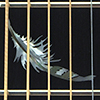|
Keeping It Green
 Guitar making can be a somewhat wasteful practice, especially for a night owl. I made the decision in 2008 to do something responsible for my future and to make up for the midnight oil I like to burn. I live in sunny Southern California, so I had solar panels installed on my roof. I have reduced my energy costs to 25% of what they used to be.
Guitar making can be a somewhat wasteful practice, especially for a night owl. I made the decision in 2008 to do something responsible for my future and to make up for the midnight oil I like to burn. I live in sunny Southern California, so I had solar panels installed on my roof. I have reduced my energy costs to 25% of what they used to be.
The Lacey Act:
On April 1st, 2010, the 2008 Farm Bill amendments to the 100 year old Lacey act went into effect for wood and wood products, including musical instruments. The requirements for documentation under the Lacey act have brought about some changes in commerce and travel.
It has been many years since I have purchased any significant woods. I have always been careful to collect woods and materials from reliable retail sources with a commitment to ethical logging and importation practices. With the exception of top woods from Italy and Germany, I do not import woods myself. I have also been happy to collect pieces from retired luthiers. Though I do not have the documentation currenty required because it was not required at the time of purchase, I am deeply committed to non-exploitation of natural resources, and I purposely do not purchase woods that come from places where exploitation is common.
It is important to be aware that regulated materials, such as wildlife flora and fauna listed as CITES I, most obviously Brazilian rosewood, cannot cross international borders without proper certification. Most woods previously purchased lack documentation, and can only travel as personal property.
For items regulated under Lacey, US-made goods cannot be returned to the US without proper documentation. For that reason, please contact me if you are outside the US to make sure all paperwork is in order for rare warranty returns.
Shell materials used for inlay purposes are particularly tricky because though they are rarely listed on CITES, they require the person in the US receiving the instrument to be licensed by Fish and Wildlife for importation. Not a problem. I keep my license current and can walk you through the process.
What I suggest for traveling musicians is to leave the beloved Brazilian rosewood guitars at home and think about commissioning a "safe wood" compliant instrument devoid of shell embellishments.
Building new instruments with tone and mojo is what custom guitar makers do, and as has been demonstrated throughout time, it's the luthier, not the wood, that matters. Jimmi has been gathering new materials and ideas for inlay projects and we're excited about possibilities.
I am pleased that our main supplier of shell materials for inlay is and has been compliant and has generously compiled information for luthiers who need to understand how to export their guitars. Here is what Chuck Erickson (The Duke of Pearl) had to say:
"As the major supplier of all things nacreous, we can assure everyone that none of the shells offered are controlled, banned, endangered, listed, or protected and they’re all openly brought in under our U.S. Fish & Wildlife Import/Export Permit."
|

|
